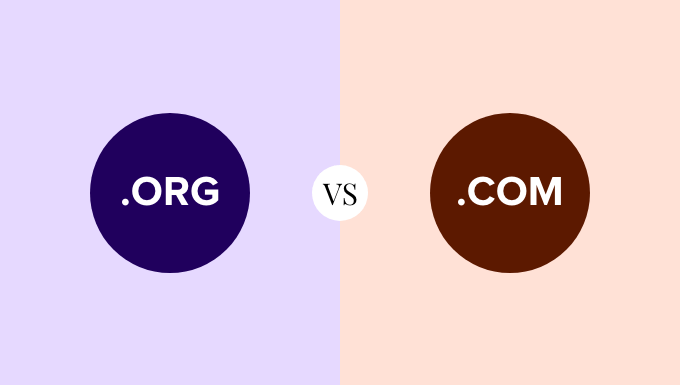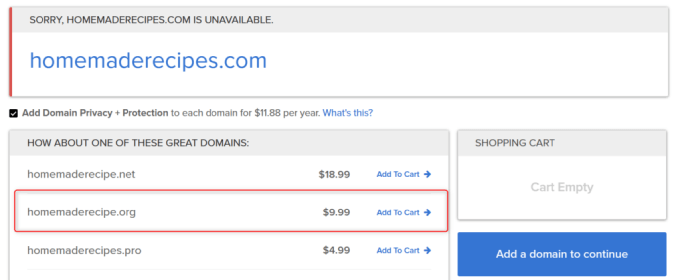Are you trying to decide whether .org vs .com is the better domain extension?
There are many types of domains, but the most popular are .org and .com. While often taken for granted, a site’s domain extension affects how others view your brand and how easy it is for users to find your site.
In this post, we’ll compare .org vs .com and highlight when to use each. That way, you’ll know which domain extension is right for your needs.

What are Domain Extensions, and Why Should You Care?
Domain extensions, also known as top-level domains (TLDs), are the last part of a domain name, appearing after the dot.
Take WPBeginner, which uses the .com extension, while a site like WordPress uses .org. (There is a .com for WordPress, but it is a commercial product, not open source.)
To understand how a domain name works, you have to know how it interacts with the Domain Name System (DNS).
When entering a website address, the DNS looks up the URL (wpbeginner.com) and finds the hosting server’s numerical IP address where the website lives.
We use domain names rather than typing the IP address because they’re much easier for humans and search engines to use and remember. In addition to the domain name itself, the domain extension can tell visitors what your website is about.
For example, .com is designed for commercial websites, while .org is meant for non-profit organizations.
When potential customers see your web address, they might make assumptions about your business based solely on your URL.
With that in mind, we’re going to highlight the differences between a .org and .com domain extension and which is better for your website. Click on any of the links below to jump to a specific section.
What is a .org Domain Extension?
The .org extension stands for organization and was created for nonprofit organizations and charities to provide valuable information.
Generally, .org websites are used to raise awareness, accept online donations, and search for volunteers. Thus, when visitors see a .org domain name, that’s what they come to expect.
That said, anyone can register a website with the .org domain extension, even if the website isn’t part of a nonprofit organization.
However, businesses can still benefit from the .org domain when linked to the company’s charitable arm, while other domain names help protect the brand.
What is a .com Domain Extension?
The .com extension is the most popular domain extension and is used by commercial businesses.
Nowadays, .com has become the default domain extension for general-purpose websites, whether or not they have commercial intent.
With that in mind, the idea of .org being only for nonprofits has stuck around a lot more than .com being only for businesses.
Differences Between .org and .com
As we said above, neither .org nor .com has special requirements to register, even though they were both made for different purposes and users expect different things from them.
Still, there are a few major differences between them that we’ll go into below.
Availability
The overwhelming popularity of .com has made it challenging to find and choose the best domain names with the extension. With many desirable domains either in use or parked, some people turn to other domain name extensions to get the URL they want.
Before you jump to other TLDs, you should start by looking at our free business name generator tool. It gives you clever ideas you can use for your domain name. Just make sure your domain name accurately represents your business and what you do.
For instance, let’s say you want to start a recipe blog.
Using our handy business name generator, you can find useful domain names like thedailyrecipes.com.

You can see in the screenshot above, that many simple .com addresses are already taken.
In contrast, far fewer .org domains are taken. In fact, there are 161.1 million .com domains registered compared to only 10.6 million .org registrations.
Because of its lower demand, .org is also much cheaper to get. That’s the opposite of many .com domain names because they are becoming more expensive because of high demand.

Credibility and Trustworthiness
Because the .org extension was intended for nonprofit organizations and is still used by many of the most well-known charities and philanthropic groups, this TLD still elicits a high degree of trust. When applied to the right site, it adds more credibility than the .com extension.
That said, it depends on what your site is used for. If you start an online store using a .org TLD, most people may be confused by your domain extension since visitors may expect to land on a nonprofit site.
This can lead to a high bounce rate and lower engagement, which also hurts your SEO.
If you own a .org site, your website should align with your target audience and their expectations of a nonprofit mission-driven organization.
The .com extension is still a more widely trusted domain than other TLDs because of its familiarity. In fact, .com domains are 33% more memorable, and when people try to remember a URL, they’re 3.8 times more likely to assume it ends in .com.
It’s also important to keep in mind that other factors determine whether a site is credible. For example, a site using HTTPS means it has active SSL encryption, which is more secure for keeping users and their data safe.
Traffic
If you’re looking specifically for branding and discoverability, .com is the best choice. If you want your potential customers to find you, .com is the most natural extension for your visitors to type in. That’s why we use the .com domain extension here at WPBeginner and for our other products.
48% of websites use .com versus only 5% for .org. Consumers view .com as the de facto default extension. Thus, you’re more likely to get people to remember a .com domain, which can increase direct traffic.
Of course, .org domains will likely rank higher for nonprofit-related keywords.
However, some mobile devices include a .com button on their keyboards, which makes them a more mobile-friendly option as well. Users can press and hold the .com button for other extensions like .org to appear.
When Should You Use a .org Extension?
While everyone can register a .org extension, it may not be the best choice for everyone. Here are a few examples of when using .org is the best choice:
- Charity, community, and nonprofit organizations: .org domains have historically been linked to nonprofit and humanitarian causes. Internet users have come to associate .org domains with charities and nonprofits. This extension can enhance the credibility of an organization as it signals a commitment to serve others.
- Open-source websites: While open-source software companies aren’t generally seen as nonprofits, they commonly use .org extensions. They do so to tell the public their software or user network is available for free. WordPress.org is an example of this.
- Informational websites: .org websites are known for providing valuable, unbiased information that helps people learn about important issues.
When Should You Use a .com Extension?
The best domain extension mainly depends on the type of website you plan to create. Here’s a quick look at when to use .com:
- Business websites: .com has a wide general appeal and is commonly used for commercial purposes making it the appropriate choice for just about any for-profit business. This works for just about any type of business and includes companies of all sizes, including small businesses and startups.
- Ecommerce stores: .com is widely used and trusted, which can instill confidence in shoppers. For example, if given the choice, a user is more likely to purchase from an online store that uses .com than a .xyz or .biz.
- Blogs and Personal Brands: .com is simply easy to remember and better for branding, helping you reach a broader audience.
Which Extension is Better
When running a small business, .com will do the trick. The extension generally performs better for SEO and helps to boost your online presence more than other domain alternatives.
It’s also seen as the default domain extension and is the go-to choice for online businesses, personal websites, publications, and blogs.
The only downside to .com is availability. With billions of websites on the internet, your desired URL may not be available in .com.
In that case, you have to weigh your options. Is altering your brand name or adding additional words to get the .com domain extension worth it?
For some, they rather keep their original name or idea and choose .org instead. Some even go for .net as an alternative.
With that in mind, we recommend using domain name generators or a site like Nameboy to help you find the right URL for your business. Since having a .com can affect your audience’s perception of your brand and traffic, it’s a good idea to find a .com URL that works for you.
Of course, there are also other TLD alternatives like .edu, .biz, .gov, and .net. If you’re creating multilingual websites or region-specific websites, make sure to use the right country code, such as .co.uk and .ca.
Ultimately, the choice is yours, but .com is best for most new website owners.
How to Use .org or .com Domain Extensions
Once you’ve decided which extension you’d like to use, it’s time to buy your domain and create your website.
1. Pick a Domain Registrar
You can purchase your domain at a few different places, including:
- Domain name registrar: Some companies like Domain.com or Namecheap provide domain registration as their primary service. The best registrars offer low pricing discounts for multi-year registrations and free WHOIS protection (to hide your personal information from domain registries).
- Web hosting service: Many hosting services will also register domain names. Sometimes, they’ll give you a great deal for choosing to bundle one with your hosting plan. For example, BlueHost offers a free domain for your first year when you choose to use their hosting services.
- Website builder: Some website builders like Squarespace let you buy a domain name, host it, and build your site all in one place.
2. Register a Domain Name
Once you’ve chosen a registrar, you can register a domain name.
Use their search tool to find and purchase the perfect domain that aligns with your business.

In this process, you’ll also have to set up your account and provide a form of payment.
3. Choose a Web Host and CMS
Now that you have your domain name, it’s time to connect it to a website. First, you must rent server space from a web hosting provider. For those using WordPress, make sure to get managed WordPress hosting, which you can get from Bluehost.

While there’s a lot that goes into making a website, using a content management (CMS) such as WordPress can make the process much easier.
And if you already have a website but once you change your domain name, check out our guide on how to easily move WordPress to a new domain.
We hope this article helped you learn the difference between .org and .com domain name extensions. You may also want to read our guide on how to choose the best WordPress hosting or how to get a free domain name.
If you liked this article, then please subscribe to our YouTube Channel for WordPress video tutorials. You can also find us on Twitter and Facebook.





Syed Balkhi says
Hey WPBeginner readers,
Did you know you can win exciting prizes by commenting on WPBeginner?
Every month, our top blog commenters will win HUGE rewards, including premium WordPress plugin licenses and cash prizes.
You can get more details about the contest from here.
Start sharing your thoughts below to stand a chance to win!
Yunus Rahman says
Great discussion on the age-old debate: org vs com domain extensions! As someone who’s struggled with this decision before, I appreciate the breakdown of the pros and cons of each option. WPBeginner’s insights always help me make informed decisions about my website’s growth. Thanks for sharing your expertise and helping me improve my online presence!
Moinuddin Waheed says
My strategy is to search for .com domain in most of the cases until and unless it’s requirement for having other extensions like .edu for education or .nic.in for government websites.
Having .com domain name makes not only easy to remember but also it makes a sense of branding in users mind.
Kushal Phalak says
I have a domain name with ‘.com’ extension and the other is ‘.co’. Can you tell me if the ‘.com’ is more superior to ‘.co’ in SEO ranking and other stuff. I want to create a bog with one and a newsletter with the other. Can you tell which one will be suitable for what?
WPBeginner Support says
We normally recommend using .com as that is what users and phones would try to visit by default.
Admin
Jiří Vaněk says
I am currently using the EU domain, as my country belongs to the European Union and the CZ domain was no longer free. However, if I had to decide between the .com and .org domains, I would definitely choose the .com domain, albeit by feeling. In my opinion, people are used to this ending and it is used a lot more. Even phonetically it sounds much better when you pronounce it. In other words, for English-speaking users, I would personally definitely choose a .com domain. But that’s just my personal biased opinion.
Ralph says
Years ago i thought having some exotic domain is way to stand out so i hade my website name + .blog but that felt weird and i just decided to use my country domain. I plan to start new website but this time for english readers and already decided .com is the best. You just think everything ends with .com becuase it is!
Konrad says
The .org vs. .com debate is quite common, and it’s great to see this being discussed here i’d like to add that there are some “exotic” domain extensions available like .zip or .ing. If you are targeting a specific audience, this could be a good choice
i’d like to add that there are some “exotic” domain extensions available like .zip or .ing. If you are targeting a specific audience, this could be a good choice 
WPBeginner Support says
Those are certainly options, we still try to recommend .com for most as that is the most common and expected from users
Admin